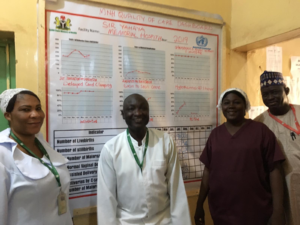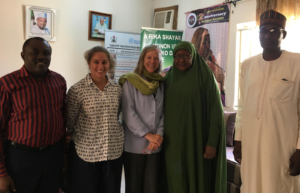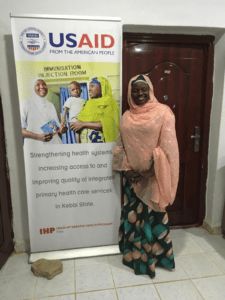Obstetric Fistula in Nigeria: WI-HER joins the states of Bauchi and Kebbi in fighting fistula
Obstetric Fistula in Nigeria:
WI-HER joins the states of Bauchi and Kebbi in fighting fistula
September / October 2019
BACKGROUND
WI-HER, LLC is leading gender integration and social inclusion efforts within the USAID-funded Integrated Health Project (IHP) in the Nigerian states of Bauchi, Kebbi, and Sokoto. IHP seeks to contribute to state-level reductions in child and maternal morbidity and mortality and increase the capacity of public and private health systems to sustainably support quality Primary Health Care (PHC) services. According to WHO, approximately 800 women die from pregnancy or childbirth-related complications around the world every day, and almost all of these deaths occur in developing countries. According to the African Population and Health Research Center (2017), ‘One Nigerian woman dies every 13 minutes – that is 109 women dying each day from preventable causes related to pregnancy and childbirth. For each death, there are an estimated 30 to 50 women who will experience life-long conditions and disabilities such as obstetric fistula.’[2] WI-HER will support the IHP states in Obstetric Fistula prevention and treatment in collaboration with UNICEF and private sector actors.
Information on obstetric fistula at the state level is limited; however, Bauchi, Kebbi and Sokoto are committed to improving the documentation and tracking of fistula; understanding the factors that obstruct or facilitate strategies to prevent, treat, and decrease fistula cases; and advancing national fistula goals and improved maternal and child health outcomes. WI-HER will build capacity of the advisory committees in each state to collaborate across clinical facilities, organizations and support state strategies and organizational efforts to protect women from fistula and make sure those suffering receive quality and timely care that meets their needs.
WHAT IS OBSTETRIC FISTULA?

Obstetric fistula is a pregnancy-related disability that occurs when a woman has been in prolonged obstructed labor. As the baby continues to put pressure on the mother’s birth canal, soft tissues become compressed, blood supply is cut off, and the vaginal wall begins to break. An abnormal hole is then formed between the vaginal wall and the bladder (vesico-vaginal fistula/VVF), or between the vaginal wall and the rectum (recto-vaginal fistula/RVF). This condition renders a woman incontinent of her urine and/or feces movements. The risk factors for OF include being a young woman with a small pelvis, a badly positioned baby, access factors such as no emergency obstetric care, ignorance, and socio-cultural practices.
According to the World Health Organization (WHO), each year between 50 000 to 100 000 women worldwide are affected by obstetric fistula, an abnormal opening between a woman’s genital tract and her urinary tract or rectum. [2] The complications of obstetric fistula, being both physical and psychosocial, are debilitating to women. The uncontrollable leaking of urine or feces gives women an unpleasant odor, and they can experience ostracism from their family, friends, and social activities [3]. This ostracization can lead to divorce or separation, or depression, which can in turn, affect the woman’s financial outcomes if her condition is a cause of her unemployment.
OBSTETRIC FISTULA IN NIGERIA

Without treatment, fistula can severely impact a woman’s health and wellbeing; she may be unable to control the flow of her urine or feces, suffer nerve damage in her legs, be rejected by her husband, family, and/or community, and experience shame and isolation. In addition to obstetric fistula, prolonged labor can lead to the death of the mother and/or the child.[4] There are approximately 50,00-100,000 new cases of obstetric fistula per year in Nigeria, in addition to an estimated 400,000 existing, untreated cases.[5]
The high rates of fistula are connected to low healthcare access, prolonged labor without access to surgical intervention, early maternal age and a lack of emergency referral services. In Jos, Nigeria, patients tended to be both short and small, with an average age of marriage of 15.5 years, but now divorced or separated, with little education or access to financial resources, from a rural area, and they developed fistula during a birth that lasted, on average, two days, and resulted in a stillborn fetus (91.7%). Of these women, 23.5% delivered at home and 76.5% delivered in a health facility; 23.5% were attended by untrained traditional birth attendants, 26.6% by someone with some level of healthcare training, and 46.6% by someone with formal healthcare training (of variable quality). The average time from development of fistula to receiving care was 1-4 years (41.5% of patients), followed by 3-12 months (23%), 5-9 years (13%) and 10-19 years (13%).[6] Women who were familiar with health services (e.g., who had previously delivered in a health facility) might be more likely to seek fistula repair services, at all and sooner, however, despite this possible confounding, it does highlight the pressing need for more deliveries in health facilities and for qualified care within those facilities.
In recognition of these alarming statistics, the Nigeria Minister of Health recently inaugurated the “Task Force on Accelerated Reduction of Maternal Mortality in Nigeria” and stated that six northern States including Kebbi were among States with the highest burden in Nigeria. Prior to this, the State Government of Kebbi and Adamawa in 2013 accessed a grant of 30 million Euros (6 billion naira) from The European Union Commission to help reduce MMR in the two states.[7] Despite these, achieving a drastic reduction in MMR in Kebbi State remains a challenge.
VVF AND RVF CASES IN BAUCHI AND KEBBI

Although there is not exact data on the incidence or prevalence of fistula in Bauchi, the state does host the National Obstetric Fistula Center through the USAID Fistula Care Plus initiative, and provides education, outreach, and free fistula repair.[8] The hospital has four surgeons trained in fistula repair, and carried out 187 surgical repairs in 2016.[9] Kebbi state hosts the Gesse VVF Center through the USAID Fistula Care Plus initiative in Birnin-Kebbi, where it works to prevent and repair fistula and to train health professionals about fistula case management.[10] In operation since 2005, the Center is the only facility in the entire state of Kebbi providing care for women suffering from fistula.[11] The Center repaired 126 cases of OF from January-July 2019;[12] 152 cases of OF in 2017, and 534 since 2014.[13] The Maryam Abatcha Women and Children’s Hospital, a public health facility in Sokoto, is part of the USAID Fistula Care Plus initiative, and provides education, outreach, and free fistula repair, with five to six women admitted daily for care.[14] On August 20, 2019 the hospital and the State Government of Sokoto launched a free fistula repair campaign with support from the Fistula Foundation Nigeria, Spotlight Initiative, the European Union, WHO, and UNFPA.[15] WI-HER will partner with key fistula stakeholders, and align with UNICEF, as well as with the “Task Force on Accelerated Reduction of Maternal Mortality in Nigeria” in Sokoto and Kebbi, to advance these efforts and the strengthen institutional mechanisms to address fistula as part of the larger commitment to improve maternal health in Nigeria.
WI-HER’s staff, with its clinical expertise and its depth of experience in meeting the needs of women and girls locally and globally is passionate about fistula response. We are proud to be working with USAID and prime contractor Palladium to strengthen the capacity of state leadership to protect girls and young women from this preventable and treatable condition, and ultimately save lives. We will help our colleagues to partner with men in all aspects of fistula response, educate boys and girls in schools on healthy behavior, open opportunities to women and girls to participate in the labor market and access economic opportunities, and address violence in all its forms – at home, at work, in the streets – against women, men, girls or boys.
WI-HER LLC (Women Influencing Health, Education, and Rule of Law) is a woman-owned small business delivering expert and state-of-the-art practical and workable solutions to complex problems. Staff have extensive knowledge and understanding of public health issues and emerging development needs globally. In addition to gender integration, leadership and management, staff have experience in professional and institutional capacity building and systems strengthening, building information systems for health and rule of law, health and legal sector reform, cultivating public-private partnerships, health financing, grants management, project design, implementation and monitoring and evaluation, and service delivery. Staff have experience working for USAID, UN, the World Bank, and the private sector, directly and as implementing partners. WI-HER has field experience in Africa, Eastern Europe, Latin America and the Middle East. Staff have extensive experience working with women and youth, orphans and vulnerable children, hard-to-reach groups, and in areas of conflict.
SOURCES
- UNFPA. Obstetric Fistula, Nigeria. Retrieved from https://nigeria.unfpa.org/en/topics/obstetric-fistula-0.
- World Health Organization (WHO). 10 Facts on Obstetric Fistula. Updated January 2018. https://www.who.int/features/factfiles/obstetric_fistula/en/
- USAID. Nigeria – Fistula Care Plus. Retrieved from https://fistulacare.org/countries/nigeria/.
- UNFPA. Obstetric Fistula, Nigeria. https://nigeria.unfpa.org/en/topics/obstetric-fistula-0. Accessed 10 September 2019.
- USAID. Nigeria – Fistula Care Plus. https://fistulacare.org/countries/nigeria/. Accessed 10 September 2019.
- Wall LL, Karshima JA, Kirschner C, Arrowsmith SD. The obstetric vesicovaginal fistula: characteristics of 899 patients from Jos, Nigeria. Am J Obstet Gynecol. 2004;190:1011–9.
- Gulumbe U, Alabi O, Omisakin OA, Omoleke S. Maternal mortality ratio in selected rural communities in Kebbi State, Northwest Nigeria. BMC Pregnancy Childbirth. 2018;18:503
- Gulumbe U, Alabi O, Omisakin OA, Omoleke S. Maternal mortality ratio in selected rural communities in Kebbi State, Northwest Nigeria. BMC Pregnancy Childbirth. 2018;18:503
- Direct Relief, Fistula Foundation, UNFPA. Global Fistula Map. Direct Relief. https://www.globalfistulamap.org. Accessed 11 September 2019.
- Nigeria – Fistula Care Plus. 2019. https://fistulacare.org/countries/nigeria/. Accessed 10 September 2019.
- Nigeria Health Watch. Beyond Surgery: Gesse Centre’s innovative approach to fistula care in Kebbi. 2019. https://medium.com/@nigeriahealthwatch/beyond-surgery-gesse-centres-innovative-approach-to-fistula-care-in-kebbi-a0bb38d9e958.
- Dakingari AB. Second quarter report of VVF Center Gesse for the Year 2019. VVF Center Gesse; 2019.
- Nigeria Federal Ministry of Health, UNFPA. National Strategic Framework for the Elimination of Obstetric Fistula in Nigeria – 2019 – 2023. https://nigeria.unfpa.org/sites/default/files/pub-pdf/FMOH-NSF-2019-2023%20Fistula.pdf. Accessed 10 September 2019.
- Fistula Care Plus, Engender Health, USAID. Dr. Abubakar Bello Profile – Fistula Care Plus. https://fistulacare.org/stories-from-the-field/provider-perspectives/dr-bello/. Accessed 11 September 2019.
- Sokoto State Ministry of Health. Sokoto State Ministry Of Health – Nigeria – Home. https://www.facebook.com/SMOHsokoto/. Accessed 11 September 2019.